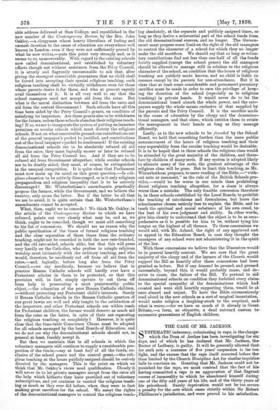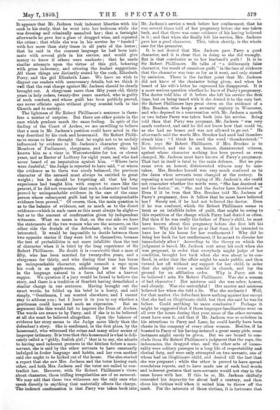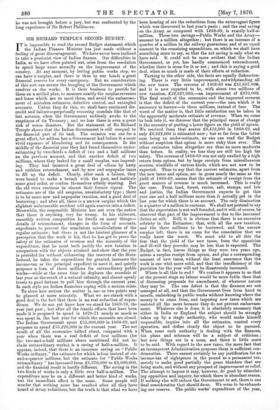THE CASE OF MR. JACKSON.
SYSTEMATIC indecency, culminating in rape, is-'the charge, which the Dean of Arches has been investigating for six: days, and of which he has declared that Mr. Jackson, the- Rector of Ledbury, is guilty. It will be generally allowed that- for such acts a sentence of five years' suspension is far too- light, and the excuse that the rape itself occurred before the time limited by the Church Discipline Act for similar inquiriese fails to convince us. Granting that Mr. Jackson could not be punished for the rape, we must contend that the fact of his having committed a rape is an aggravation of that flagrant course of immorality to which he abandoned himself during one of the fifty odd years of his life, and of the thirty years of his priesthood. Surely deprivation would not be too severe a penalty for the acts which came strictly within Sir Robert Phillimore's jurisdiction, and were proved to his satisfaction.
It appears that Mr. Jackson took indecent liberties with his cook in his study, that he went into her bedroom while she was dressing and criminally assaulted her ; that a fortnight afterwards he gave her a glass of drugged wine, and repeated the crime ; that while she was in his service he "tussled" with her more than sixty times in all parts of the house ; that he said in the coarsest language he had been inti- mate with several girls in his service, and would give money to know if others were unchaste ; that he made similar attempts upon the virtue of this girl, behaving with gross indecency, and uttering the foulest suggestions. All these things are distinctly stated by the cook, Elizabeth Parry, and the girl Elizabeth Lane. We have no wish to disgust our readers with unnecessary details, but we think it well that the real charge against Mr. Jackson should be clearly brought oat. A clergyman more than fifty years old, thirty years in holy orders, twenty-five years married, who is guilty of such conduct, and. whose guilt has been publicly proved, can never officiate again without giving scandal both to the Church and to society.
The lightness of Sir Robert Phillimore's sentence is there- fore a matter of surprise. But there are other points in the case which produce much the same feeling. In spite of the finding of the Court of Arches„ we are unwilling to believe that a man in Mr. Jackson's position could have acted in the way described by his cook and housemaid. Sir Robert Philli- mere seems to have thought that he ought not to be unduly influenced by evidence to Mr. Jackson's character given by Members of Parliament, clergymen, and others, who had known him as a vicar in Worcestershire for ten or eleven years, and as Rector of Ledbury for eight years, and who had never heard of an. imputation against him. "Where facts were doubtful," the Judge is reported to have said, "or where the evidence as to them was nicely balanced, the previous character, of the accused must always be entitled to great weight ; but he should be forgetting all that his long experience had taught him with respect to cases like the pre.sentrif he didnot remember that such a character had been proved by unimpeachable evidence in the case of the same person whose subsequent guilt had. by no less unimpeachable evidence been proved." Of course, then, the main question is as to the balance of evidence, not so much as to the direct evidence—which in such cases as this must always be slight— but as to the amount of confirmation given by independent witnesses. What we mean is that, on the one side we have the statements of the two women who are the accusers, on the other side the denials of the defendant, who is still more interested. It would be impossible to decide between these two opposite stories if they were left to themselves, because the test of probabilities is not more infallible than the test of character when it is tried by the long experience of Sir Robert Phillimore. No doubt it is conceivable that a man of fifty, who has been married for twenty-five years, and a clergyman for thirty, and who during that time has borne an unimpeachable character, might commit a rape upon his cook in an apple-room, addressing her at the time in the language natural to a farm lad after a harvest supper. We question if a jury would be found to believe the story, and there is a tradition of Scarlett having demolished a similar charge in one sentence. Having brought out the exact words, he folded up his brief in a hurry, and said simply, "Gentlemen, I am wanted elsewhere, and I cannot stay to address you; but I leave it to you to say whether a gentleman could have used such an expression." But an argument like this would fail to impress the Dean of Arches. The words are sworn to by Parry, and if she is to be believed at all she must be believed altogether. Upon the balance of evidence her story seems to the Judge more likely than the defendant's story. She is confirmed, in the first place, by the housemaid, who witnessed the crime and many other scenes of improper intimacy. It is true that this housemaid is what is deli- cately called a "giddy, foolish girl ;" that is to say, she admits to having used indecent gestures in the kitchen before a man- servant, she is said by the other servants to have constantly indulged in fouler language and habits, and her own mother said she ought to be kicked out of the house. She also started a report that she saw Mrs. Jackson and the tutor kissing each other, and both Mrs. Jackson and the tutor are called to con- tradict her. However, with Sir Robert Phillimore's views about character, these trifling irregularities are of no moment. We may- add that these two witnesses are the only ones who speak directly to anything that materially affects the charge. The indirect confirmation is that Parry was taken back into
Mr. Jackson's service a week before her confinement, that he was several times told of her pregnancy before she was taken back, and that there was some evidence of his having believed in it ; and that when she finally left his service, Mrs. Jackson gave her a good character. This, taken shortly, is the whole case for the promoter.
It is not denied that Mrs. Jackson gave Parry a good character, and it is clear that in doing so she did wrongly. But is that conclusive as to her husband's guilt ? Ibis to Sir Robert Phillimore. He talks of "a deliberately false character, the result of conscious guilt," in the face of evidence that the character was true so far as it went, and only sinned by omission. There is the further point that Mr. Jackson did not know of the character being given, and when he 'heard of his wife's letter he expressed his disapproval. It is a more serious question whether he knew of Parry's pregnancy. The doctor told him of it before she left his service the first time, but on being taxed with it she denied it to the very last. Sir Robert Phillimore lays great stress on the evidence of a Mrs. Brookes, who keeps a servants' registry in Worcester, and who deposed to a conversation with Mr. Jackson a month or two before Parry was taken back into his service. Being told then that Parry was pregnant, Mr. Jackson "was very much confused, and said he did not know how that could be, as she had no beaux and was not allowed to go out." He afterwards said the words Mrs. Brookes had used had thunder- struck him : "I think be used the word 'thunderstruck.'" Now, says Sir Robert Phillimore, if Mrs. Brookes is to be believed, and she is an honest, disinterested witness, against whose character nothing has been proved or even charged, Mr. Jackson must have known of Parry's pregnancy. That fact in itself is fatal to the main defence. But we pre- sume even an honest, disinterested witness may be mis- taken. Mrs. Brookes herself was very much confused as to the dates when servants were changed at the rectory. In repeating a most important saying of Mr. Jackson's, she could not remember whether the words were, "She has deceived na and the doctor," or, "She and the doctor have deceived us." Even if it be true that Mrs. Brookes told Mr. Jackson of Parry's pregnancy, does it follow that he must have believed her ? Surely nob, if he had not believed the doctor. Even if he was confused, which Sir Robert Phillimore seems to treat as an infallible index of guilt, that might be owing to this repetition of the charge which Parry had denied so often. But then if he was really the father of Parry's child, he must have known about this pregnancy before she first left his service. Why did he let her go at that time, if he intended to have her in his house for her confinement Why did he bring her back for her confinement, if he meant to dismiss her immediately after ? According to the theory on which the judgment is based, Mr. Jackson sent away his cook when she was pregnant, in order that everybody might judge of her condition, brought her back when she was about to be con- fined, in order that the affair might be made public, and then turned her off without any support for her child, in order that she might cause a scandal in church, and lay the ground for an affiliation order. Why is Parry not to be believed ? asks Sir Robert Phillimore. Was she a woman of bad character ? Her mistress said she was sober, honest, and cleanly. Was she untruthful ? Her master and mistress believed her when she told a lie. Was she unchaste ? Well, for that matter, the defendant knew nothing against her except that she had an illegitimate child, but then she said he was its
father. Could anything be more conclusive Perhaps it might be suggested that if these improper familiarities went on all over the house during that year, some of the other servanta must have seen it, and that if Mr. Jackson was so sedulous in his attentions to Parry and Lane, he could hardly have been chaste in the company of every other woman. Besides; if he boasted to Parry of his having seduced a great many girls, some instances might surely be given. But we are bound to con- clude from Sir Robert Phillimore's judgment that the rape, the indecencies, the drugged wine, and the other acts of immo. rality were solitary passages in a long life of respectability and clerical duty, and were only attempted on two servants, one of whom had an illegitimate child, and denied till the lust that she was pregnant ; while the other is proved to have spread scandalous reports, and to have made use of such foul words and indecent gestures that men-servants would. not stay in the same house with her. If this be so, Mr. Jackson skilfully concealed his depravity for about half a century, and then chose his victims well when it suited him to throw off the mask. For the interests of those victims, it is fortunate that he was not brought before a jury, but was confronted by the long experience of Sir Robert Phillimore.
































 Previous page
Previous page